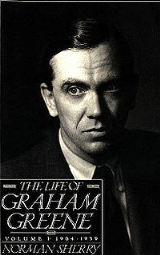
, CH
(2 October 1904 – 3 April 1991) was an English
author
, playwright
and literary critic. His works explore the ambivalent moral and political issues of the modern world. Greene was notable for his ability to combine serious literary acclaim with widespread popularity.
Although Greene objected strongly to being described as a Roman Catholic novelist rather than as a novelist who happened to be Catholic, Catholic religious themes
are at the root of much of his writing, especially the four major Catholic novels: Brighton Rock, The Power and the Glory
, The Heart of the Matter
and The End of the Affair
.
Have you seen a room from which faith has gone?...Like a marriage from which love has gone...And patience, patience everywhere like a fog.![]()
The economy of a novelist is a little like that of a careful housewife who is unwilling to throw away anything that might perhaps serve its turn. Perhaps the comparison is closer to the Chinese cook who leaves hardly any part of a duck unserved.![]()
It is the story-teller's task to elicit sympathy and a measure of understanding for those who lie outside the boundaries of State approval. ![]()
Morality comes with the sad wisdom of age, when the sense of curiosity has withered.![]()
My two fingers on a typewriter have never connected with my brain. My hand on a pen does. A fountain pen, of course. Ball-point pens are only good for filling out forms on a plane. ![]()
A petty reason perhaps why novelists more and more try to keep a distance from journalists is that novelists are trying to write the truth and journalists are trying to write fiction.![]()
The world is not black and white. More like black and grey.![]()
That instinct for human character that is perhaps inherent in an imaginative writer.![]()
A major character has to come somehow out of the unconscious.![]()
The moment comes when a character does or says something you hadn't thought about. At that moment he's alive and you leave it to him.![]()

